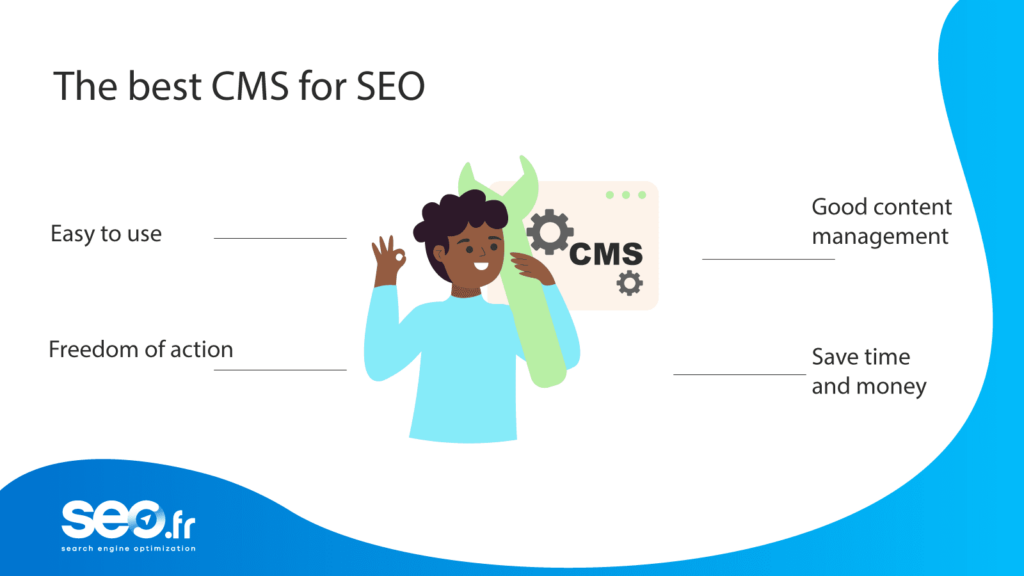Creating your website with an SEO-friendly CMS is the first step on the road to online visibility. Although Adwords advertising is an excellent shortcut to the SERP, natural referencing remains an essential ally. However, to achieve these results, you need to opt for a pro SEO CMS as soon as you build your site. Which CMS should you choose to build a site that meets SEO criteria? SEO.fr gives you all the information you need to choose the right website creation software.
What features make SEO easier for search engines?
Creating your site without thinking about on-page SEO features is like casting a shadow. Your business won’t get the online exposure it deserves. Even if you choose an SEO CMS, you still need to master the best practices for being visible in search results. On-site SEO therefore represents an important foundation that gives you control over site content and architecture.
Whether naturally or with specific plugins, check whether your SEO-friendly CMS allows :
- Title and metadata modification.
- Customize Title tags.
- Create your own URLs.
- Redirect management.
- Optimizing image and media referencing

In addition to these points, it’s essential to consider certain SEO factors that will boost your site’s natural referencing. Which factors? You need to define the web pages that indexing robots can crawl and rank in search engines. This is important if you don’t want all your web pages to be visible in the results. A pro SEO CMS gives you the power to manage website crawling and indexing.
How do you know if your authoring tool can do this? Find out whether your CMS software supports automatic sitemap creation. Other features include the Noindex directive for pages, and canonical tags for checking duplicate content. Don’t forget to check 301 redirects and other status codes. These functions can be integrated into the CMS or added via an extension.
An SEO CMS features an analytics tool or allows you to install one for various audits. In addition, today’s best site editors offer fast loading times and comfortable navigation.
How do you choose the right CMS for SEO?
Adopting CMS solutions remains an effective way of opening a site without technical knowledge. Even if you haven’t mastered HTML code or programming languages, you can set up your own web showcase. However, not all CMS are alike, and not all have equivalent SEO performance. So how do you identify CMS SEO?
There are a number of relevant points to focus on when choosing your web software.
- Consider UX optimizations
An easy-to-use, intuitive CMS tool increases your site’s productivity and enhances the user experience. It’s easy to administer and therefore simple to learn. To ensure the success of your web project, choose an SEO-friendly CMS that incorporates ergonomic web design, as this will enable your site to be visible, readable and load quickly. As a result, your showcase will attract more organic traffic.
- Consider CMS scalability
Search engines aren’t static, least of all Google and its algorithms. They evolve daily, optimizing search results for quality and relevance. To stay in line, you need to build your site with a flexible CMS capable of following and integrating SEO trends.
- Observe the responsiveness and quality of technical support
You don’t want to find yourself alone or at a loss when it comes to maintaining your site? Would you like to benefit from a technical support service provided by professionals who know the system’s source code? Find out if your CMS has a responsive community and offers quality technical support.
- Check your web software’s synchronization with other applications
Your CMS pro SEO must be able to integrate with your various marketing tools. Check whether your site builder integrates :
- Marketing automation platforms
- Emailing applications
- SEO reporting tools such as Google Analytics, Google Search central, etc.
- CRM.
Choose a site editor with extensions or dynamic APIs to facilitate the interconnection of all your applications. To sum up, let’s look at the two fundamental criteria for choosing the right CMS for SEO.
Got an SEO question?
Géraldine can help
5 years of SEO expertise

CMS SEO: prefer accessible source code
An open-source CMS is flexible in terms of design, allowing you to customize your site in a variety of ways. With this type of web solution, you can adapt your web showcase to your needs. You can update site components such as menus, footers, sidebars, etc. quickly and easily. Bear in mind that some SEO features require access to the system’s source code. Choose an open source solution for greater efficiency. This gives you a great deal of freedom of action.
Ease of use and content management
The more intuitive and straightforward a content management system is, the more it appeals to search engines. Your SEO CMS must be easy to manage if you want to get good search engine results. Choose an authoring tool that can help you program or upload content with ease.

What are the different CMS for website SEO?
Choosing an SEO-friendly CMS remains an effective way of creating your own website and ranking it in search results. What’s more, it’s less expensive than developing a custom site. Want to create an optimized web page? Discover the 8 best content management systems to adopt to please search engines.
- Prestashop
Prestashop is an SEO-friendly CMS. It can be used to create an SEO-optimized e-commerce site. It’s a popular e-commerce CMS in France, thanks to its versatility and flexibility. This creation tool integrates SEO extensions and plugins that are not free of charge, but which are highly effective.
- WordPress
The WordPress CMS is popular, free, open source and allows you to create many different types of site. Whether it’s a blog, a small website or a corporate site, this SEO-friendly CMS takes care of it all. It’s ideal for designing your own site, thanks to builder themes like Divi and Elementor. It features an accessible, flexible interface equipped with easy-to-use modules and templates. And WordPress guarantees a better user experience. It offers powerful, free SEO plugins and extensions, such as Yoast SEO, to help improve site ranking.
- Woocommerce
This is a WordPress add-on designed to create e-commerce stores. This SEO-friendly website builder brings you :
- More organic traffic to your online store over the long term.
- Greater visibility thanks to better positioning in search results.
- Easy to get to grips with site management.
- More sales to accelerate your online profitability.
- Magento
This SEO CMS is open source, flexible, customizable and scalable. It facilitates the creation and management of online stores thanks to its easy-to-use interface and powerful features. Well-known brands such as Coca-Cola and Nike have designed their sites with Magento and benefit from high search engine rankings. Like WordPress, this content management system guarantees secure web hosting.
- Drupal
Drupal is an SEO expert CMS, i.e. a site editor designed for professionals with good coding skills. If you have technical skills, you can fully customize it and adapt it to your keyword strategy. It integrates all on-page SEO features and benefits from higher SERP rankings. Drupal uses the FTP file system, so migration to other content management systems like WordPress is possible.
- Shopify
Shopify is the best CMS for getting started in e-commerce, enabling you to set up your own online store without any prior knowledge. This turnkey creation tool offers all the relevant features for on-site SEO.
- Wix
This web page builder features customizable templates with predefined functionalities. With Wix, you design a site with a responsive design, optimize your SEO. You get mobile traffic and tracking tools to check your site’s performance on the web. Like all pro SEO CMSs, Wix is hosted by an SSL-certified provider, a guarantee of security.
- Oscommerce
This SEO CMS is a high-performance e-commerce solution. Ideal for developing your store internationally, the platform features user-friendly, multilingual administration. It offers the possibility of :
- Customize URLs, customizable meta tags.
- Structure web pages simply and efficiently.
- Optimize site referencing on search engines.
What does a web agency offer when it comes to choosing a CMS?
Need help choosing the best CMS? You’ve tested content managers and read several online blogs to learn about authoring tools, but you’re still having trouble settling on one? A CMS SEO agency presents a detailed comparison of the strengths and weaknesses of different content management systems.
They listen to your needs and help you adopt the best CMS for your web project. In addition to choosing an SEO-friendly CMS, web design agencies work with experienced webmasters and developers who can create a professional, SEO-friendly site. What’s more, you benefit from the services of a graphic designer who will set up your visual identity and take care of your image on the web.
To help you be visible on the Internet, your agency works on your keyword strategy and designs an editorial line for the creation and writing of optimized content. It manages your netlinking campaigns to give your site greater authority. Are you thinking of working with a SEO agency to promote your business online?









